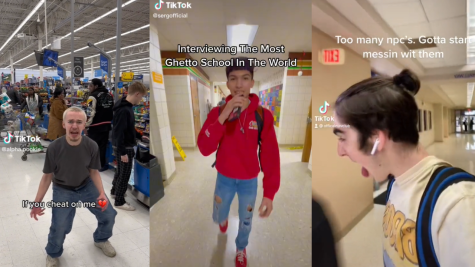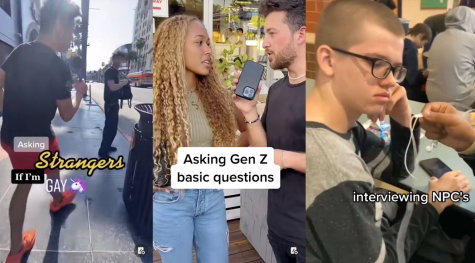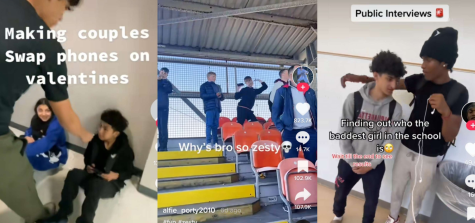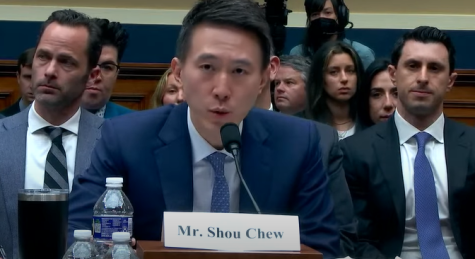Has TikTok Culture Promoted a Standard of Casual Hostility?

TikTok has made a meteoric rise in the past few years, and alongside it, an increasingly hostile, unsafe and restrictive public environment. TikTok’s short-form video platform instead creates an environment that is excessively hostile to anyone who stands out in a way that cannot or has not been thoroughly commodified.
Social media platforms and their influencers present a world where microfame can be thrust on just about anyone. This is the framework through which social media, especially video-based platforms, calls teens, tweens and other worldwide fame-seekers to action. TikTok’s algorithm creates a culture of social “other” groups having their distance from the dominant culture exacerbated.

Subcultures, societal minorities, those with disabilities and various other groups are at best misrepresented within the dominant-cultural consciousness and reduced to their most palatable and marketable selves, and at worst used as targets for harassment, zoo-like ‘point and laugh’ behavior and exoticization.
To make it worse, massively popular low-effort content styles like spontaneous interviews with members of the general public, sardonic ‘comedy’ commentary stitches, and recorded clips of social “others” living their lives in public with derisive captions meant to bait ridicule. These content styles make public spaces near-uninhabitable for anyone belonging to any sort of social other. All angles are potential avenues to harassment and ridicule, every phone represents a potential recorded clip of your daily life to be sent out to the masses. This contributes to already-existing social pressures upon cultural outliers and magnifies them by a percentile degree in the thousands.
DVC, however, exists as one of many unmarked epicenters of this cultural shift. Currently, DVC rules disallow recording if permission wasn’t given. However, even in situations where permission was given to record, the caption, surrounding text and editing can change the narrative presented drastically and invite additional ridicule.

This epidemic, as many at DVC cite it, is growing exponentially. Connor Vautrin, an experienced member of DVC’s Leadership as well as an openly trans man, felt quite strongly about this breaking down of boundaries relating to privacy, public life and interpersonal safety.
“I feel like it’s definitely made the public less safe. People knowing that hundreds or thousands of people would defend them in being aggressive towards queer people creates a cushion for them to fall back on,” said Vautrin. “At this school there is not a true zero tolerance policy, allowing students to target queer students without any repercussions. TikTok videos filming and mocking behavior for being ‘weird’ gives people permission to do it themselves, and allows people to understand that they and others can get away with it.”
But queer people aren’t the only ones hit hard by cultural movements like this – disabled people, women and those with socially “deviant” cultural or behavioral styles are being profoundly affected, even within DVC’s walls–and it’s worse than one might initially think as someone on the outside.
Luna Acosta, a senior, went on record saying “I’m all for jokes, y’know, but I am fairly visibly bi. Not to my parents, but, like, I get these people going way too far all the time. If someone is okay with being recorded, that’s fine but there is no reason anyone should just be recording random people living their lives.”
Jazmin Jacamo, head of the Friendship Club, a club devoted to creating a safe and accepting social environment for kids with special needs, shared how this has affected her personally as well as the club members.
“I think, as a woman, I have definitely noticed TikTok bringing some harassment [to me]. I think, like, when I’ve seen people just recording the F.U.T.U.R.E.S. kids or my [autistic] sibling. I think TikTok has made a lot of people feel comfortable being really cruel,” she said.
In a survey sent to DVC students, 37.5% of students reported that they’ve been harassed at or around DVC. The school’s conflict resolution system is often under-equipped to deal with this kind of harassment. This, unfortunately, has led to an environment where a large segment of students, including some mentioned in this article, don’t feel like DVC administration will reach a conclusion that is worth their trouble.
Ultimately, even with a potential TikTok ban on the table, the social media landscape is still significantly in favor of this noxious culture, TikTok or not. The only thing that remains to be seen, however, is if a rise in public consciousness will affect any change on this front positively or if things will continue to get worse for those on the margins of society in the public arena.
